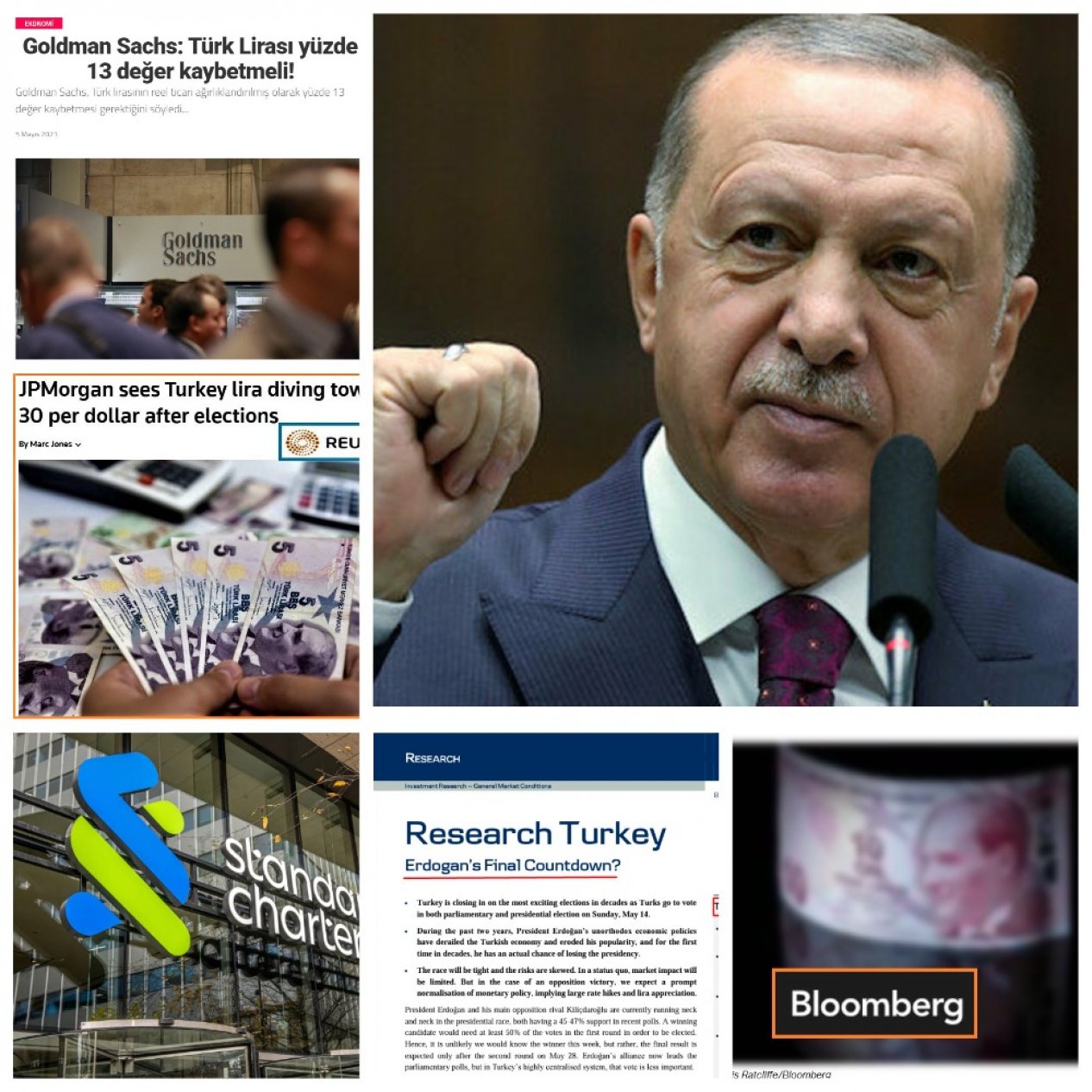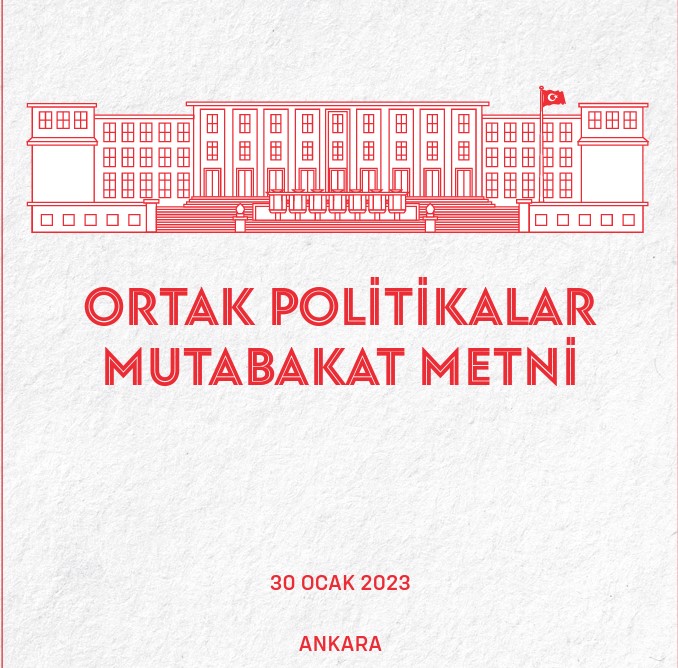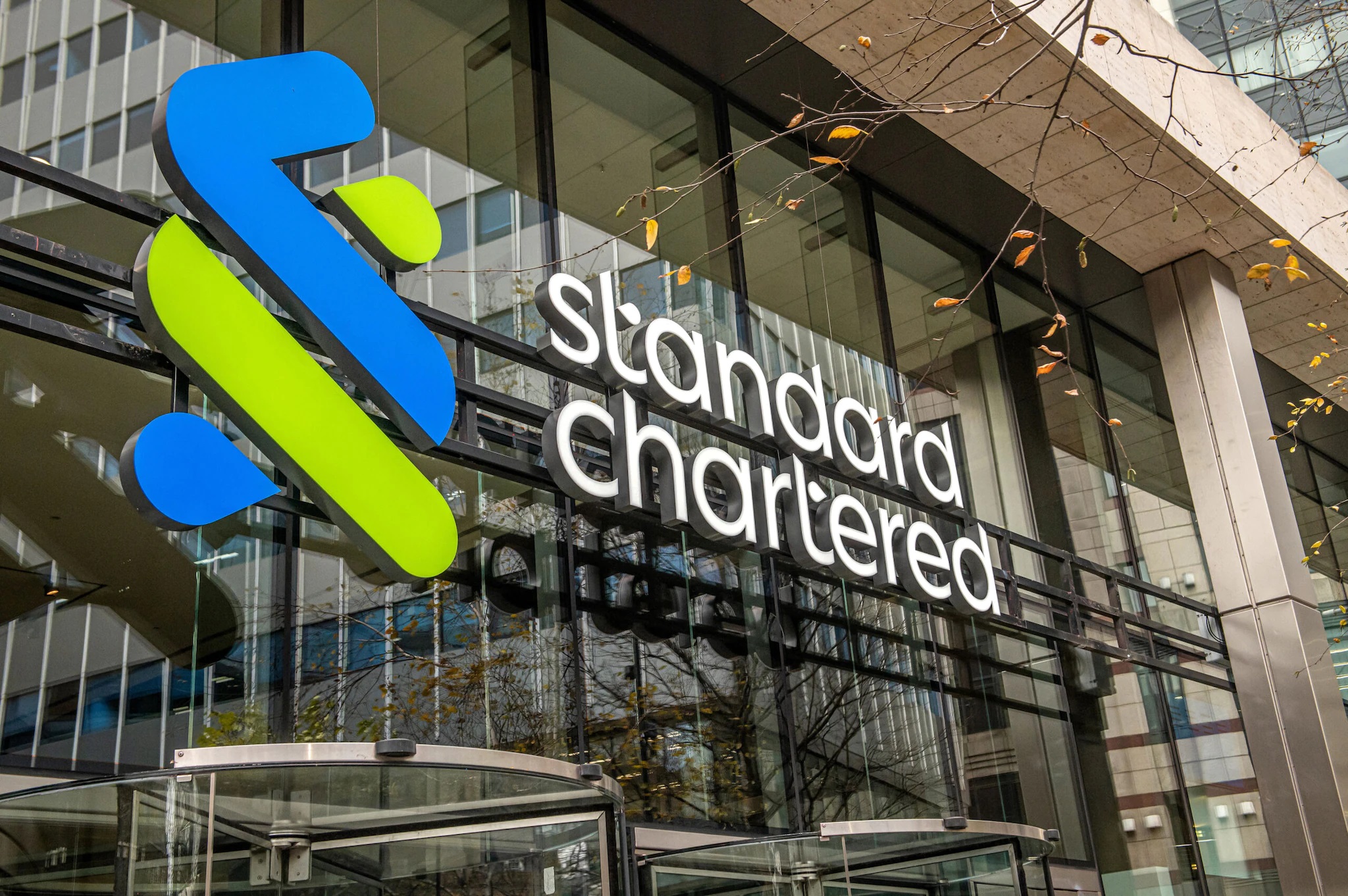
The election campaign of the two poles competing in the presidential and parliamentary elections to be held in Türkiye on May 14 - the Nation Alliance and the People’s Alliance - has entered the most decisive stage, and both sides are talking about their future plans based on their election programs. The leader of the ruling Justice and Development Party (AKP), Recep Tayyip Erdogan, relies on the megaprojects he has signed and the many successes he has achieved. The loyalty to the promises he made so far, the ability to turn his power and capabilities into reality have formed real perceptions of President Recep Tayyip Erdogan in the Turkish public. However, there is no unanimous opinion about CHP chairman Kemal Kilicdaroğlu, who is the candidate of Nation Alliance, because he has not been in power and has not served the state and the people, so there is no serious basis to evaluate his activities. From this point of view, the number of those who believe in Kilicdaroğlu's promises about economic and social welfare is quite large, and the number of those who do not believe him is quite big as well.
The fact is that the 244-page document "Ortak Mutabakat Metni" (Common Policy Agreement) released in February by the People's Alliance, whose main author is the Republican People's Party (CHP), is regarded as a non-serious document in Turkish public circles. Because none of its articles are original and there are no new targets. The text of the document is the same in terms of content, but different in form, developed on the basis of the articles of the Election Manifesto announced by the AKP back in 2002. A large part of the target priorities has been implemented by Erdogan's government during its years in power. Thus, each clause of the main articles such as law and judiciary, public administration, fight against corruption, transparency and control, economy, finance and employment, science and education, entrepreneurship and digital transformation, social policy, foreign policy, defense and security, migration, the vast majority of each goal was fulfilled by the AKP. The Nation Alliance added only two clauses to the economic and social policy clauses of the document - refund of money obtained through corruption and foreign currency taken out of the country.

The main issues that are different in the Joint Memorandum, which are presented to the public as innovations, are related to changes in foreign policy and security, regional cooperation, democracy, human rights, electoral legislation, which were prepared in the context of the interests of the West and serve to withdraw Türkiye from the national struggle and the principle of decisive power. Thus, integration into the West, subordination of Türkiye’s national and political interests in the region to European interests, rejection of military-political projects, distance from Islamic values, acceptance of European values as basic principles and guarantee of human rights, including the protection of the rights of representatives of sexual minorities and LGBT members, giving political and social rights to the PKK and Peoples' Democratic Party, etc. clauses are the main "new priorities". reference
Since the AKP implemented a large part of the economic initiatives included in the Common Policy Agreement before the election, those clauses have already entered the archives of history. For example, Kilicdaroğlu, who called Erdogan's plan to start gas production in the Black Sea as a fairy tale and claimed that this economic project would be possible after they came to power, remained silent on April 20, 2023, after the gas infrastructure of 710 billion cubic meters was launched in Filyos. Kilicdaroğlu, who once mocked that Türkiye would produce the national TOGG car, local tank, military ship, national aircraft, and stated that this would never happen during the AKP regime, included these realized projects in his economic initiatives. Erdogan is making his promises about economic reforms a reality.
Kilicdaroğlu, who apparently has no new ideas and programs, is currently busy making promises to the citizens about the future economic development of Türkiye in the election marathon.
Leaving them aside for now, we would like to draw attention to the fact that some economic research groups and centers of the West joined the campaign in favor of the Nation Alliance in the election process.
Promotion of the Nation Alliance by Western economic research groups
Goldman Sachs, one of the largest investment institutions in the US, is trying to create false perceptions that Türkiye’s financial and banking system is about to collapse. It reminds that the country is experiencing a difficult period against the backdrop of high inflation and sharp devaluation of the national currency of the Central Bank of Türkiye. Quote: “Turkish lira should depreciate by 13 percent in the coming years. if this does not happen, a correction in the current account deficit may be required to prevent the sharp depreciation in TL. The bank’s analysts noted that deposit levels in the spot currency look fairly fair if a similar correction occurs in the 2018-2019 period. If the current account deficit reaches 7-8 percent of the gross national product, there will be an 18 percent depreciation in TL.”

Goldman Sachs is campaigning that if the current financial management continues, that is, if Erdogan wins the re-election, the current 19.50 exchange rate of the dollar against the Turkish lira may rise to the exchange rate range of 22-23. source
This idea is open speculation based on false forecasts and is to create distrust in Erdogan's government by announcing that the lira will lose its value sharply and the economy will deteriorate. The goal is to guide citizens to believe that economic success will be achieved by changing the government, and to call on the opposition to trust.
JPMorgan, another global financial organization of the United States, made "forecasts" that questioned the financial policy of the current government of Türkiye some time ago. The institution believes that the high inflation in Türkiye has a heavy impact on social life in the country and creates obstacles for investment programs for international investors against the background of repeated market fluctuations. That is, if no changes are made in the economic policy after the elections, this alarming situation will continue. The exchange rate of the US dollar against the Turkish lira will increase to 25 lira in the "strong policy" scenario, and to 30 lira in the "moderate policy scenario". source 1: Bloomberg source 2: Reuters

From this "forecast", even a high school student can judge that the current government of Türkiye is not capable of making changes in the direction of improving the country's economic situation. JPMorgan urges the Turkish voter to say "if you want changes in the economic policy, don't vote for the current government" with this hidden message and hints.
Another similar diversion can be seen in the position of Denmark's leading financial institutions. "Danske Bank", Denmark's largest financial unit, in its remarks about the presidential and parliamentary elections to be held in Türkiye on May 14, shows its ugly intention to directly serve the opposition's election propaganda by criticizing the economic policy of the ruling AKP: Quote: "During the past two years, President Erdogan's non-conventional economic policies derailed the Turkish economy and lost popularity. In the event of the victory of the opposition, we expect the stabilization of the financial situation in Türkiye, the normalization of the monetary policy, large interest rate increases and the appreciation of the lira. Reference

Let's pay attention to a rather ridiculous and regrettable forecast: Minna Kuusisto, chief analyst of Danske Bank expressed her true intention and emphasizes that the victory of the opposition will undoubtedly be a turning point in economic policy in many ways, and our economic forecasts will come true. "If the government does not change after the election, there will be no serious changes and positive effects on the markets. source
The UK’s Standard Chartered financial institute says that despite the government's economic growth incentives and financial incentives, the financial system will allegedly deteriorate under pressure, and the value of the national currency will lose a little. This organization, which reduced Türkiye's economic growth forecast for 2023 from 3 percent to 2.5 percent, claims that "the elections may be a turning point for Türkiye" and emphasizes that the new government can ensure the normalization of the economy. Reference

It is possible to see similar political motives from the opinion of Morgan Stanley, the US global investment bank. Instead of conducting an economic analysis, this research group tries to manipulate the future prospects of the Turkish economy directly on its own political interests. The report states that in the scenario where Recep Tayyip Erdogan wins the election, the low interest rate policy in the financial and banking sector will continue, financial conditions and market interest rates will be determined by alternative instruments and banking sector regulations, which supposedly will not open opportunities for economic development initiatives. Under the current conditions, the exchange rate will rise sharply and the dollar will rise sharply in the last quarter of 2023 due to increasing imbalances. This may also cause the Central Bank to partially increase interest rates. A recession will occur in 2024 until the rise in inflation and the associated new macro policy framework.
According to the report, financial stability will be restored if the Nation Alliance, which nominated Kemal Kilicdaroğlu, wins in the election, and the Central Bank may raise the interest rate to 30-35% at the first stage, and to 40-45% at the end of the year, which encouraging for the financial sector and business. Regarding the general state of the economy, it was stated that due to the disinflationary environment in 2024, there will be an economic contraction in the first three quarters, and then a rapid recovery may take place. Reference
As it can be seen, the approach of Morgan Stanley is purely related to the political event, and false and populist predictions are made that Türkiye will enter a new stage of economic development if Kilicdaroğlu is elected president. This report itself directly serves the election campaign of the CHP and can be evaluated as a scenario of provocation directed against Erdogan.
The number of materials of such economic institutions working for the benefit of the Nation Alliance and serving the election campaign is quite large and it would take a long time to present each of them separately. Summarizing each of them, there is no doubt that they are based on the same similar scenario. Because none of them want to touch on any of the successes achieved thanks to Erdogan's leadership, they don't mention a single sentence or an ordinary number about the positive dynamics happening in the Turkish economy.
However, in complete contrast to the predictions of these institutions, Türkiye's financial and banking system, social sector is getting stronger
Türkiye's economy has shown the best growth rate in Europe, growing by 5.6 percent in 2022. GDP in 2022 was $950 billion. reference
According to the budget draft of 2023, the budget expenses are 4.470 trillion TL, and the budget income is 3.810 trillion TL. This means $255 billion.
Türkiye's state budget has increased about 45 times in the last 20 years.
Education expenses in the budget amounted to 7.5 billion liras when AKP came to power in 2002, but now they have been increased to 435 billion liras. The money allocated to education has been increased 58 times in the last 20 years.
During 2002-2023, social budget expenditures aimed at social protection of the population increased more than 161 times, from 1.6 billion in 2002 to 258.4 billion liras in 2023. The expenses allocated to the health sector increased 45 times from 15.5 billion lira to 696.8 billion lira.
In 2023, 11 billion lira subsidies were given to small and medium enterprises, 142.9 billion lira were allocated to agriculture, and 145.4 billion lira were allocated to support the real sector. The government provides subsidies of 80 and 50 percent for citizens' use of electricity and natural gas. reference
Currently, Türkiye's annual exports increased by 12.9 percent last year and reached $254.172 billion. However, exports amounted to $35 billion in 2002, which means that the country's export power has increased 8 times in the last 20 years. source
During 2002-2022, the amount of foreign investment in Türkiye exceeded $240 billion. reference
The AKP managed to raise the GDP 7 times over the last 20 years, and the GDP, which was $150 billion, has now approached $1 trillion. GDP per capita increased from $2,584 to $10,700. reference
The tourism and industrial sector in Türkiye has broken world records in the last 20 years. If the number of tourists was 13 million people in 2002, it reached 50 million people in 2022, the income from this field has increased from $8.5 billion to $46.3 billion, and Türkiye has entered the top 8 tourism countries in the world. source
Türkiye's strategic foreign exchange reserves have also grown significantly in the last 20 years and have now reached $122.5 billion. reference
Türkiye continued the growth rate of the economy in the first quarter of 2023 as well as in 2022. Despite the fact that 20 percent of the state's economic resources remained out of circulation as a result of the devastating earthquake that occurred in February, the national economy grew by 117.2 billion liras or $7 billion. Banks' economic financing sources have expanded and increased by 14 to 117.5 billion liras ($7.5 billion) compared to the same period last year. Reference

The West stands behind the problems arising in the banking and monetary market of Türkiye, the depreciation of the lira and dollar speculations. We have encountered artificial pressures against the national currency of Türkiye, "currency speculations", and in this process, the cooperation of local treacherous financiers and the foreign investors who control them, even on the eve of the municipal elections in Türkiye. President Recep Tayyip Erdogan has stated this several times. reference
When approached from this perspective, the trends we have shown above unequivocally reinforce the following conclusion:
- The increase of Türkiye's economic power does not benefit the West. The fact that Türkiye's weak and economic management is in power, and especially that the financial system is in the hands of huge global financial pyramids, means that the political demands and orders of international powers are accepted easily and comfortably.
- The economic power of Türkiye means that European countries are hegemonic in global markets and large trans-continental projects. In this regard, the West wants to see Türkiye as a weak and dependent country.
- The European Union is concerned about having a say in the Black-Mediterranean-Marmara seas and international straits. We have watched this against the background of Western anxiety and concerns when Türkiye opened the "grain corridor" and other humanitarian corridors during the Russia-Ukraine war.
- Türkiye's construction of the Middle Corridor highway connecting the Turkic states is not in the interests of the West, because the huge transit artery from China to the Turkic states of Central Asia and the Caucasus, as well as Hungary, which has officially become a member of the Organization of Turkic States in Eastern Europe, meets the state that has become a family of Turkish geography. Against the background of Türkiye's strategic alliance, it is not in the interests of Europe and the United States.
- The backbone of Türkiye's economy is the industry, and the defense and technologies, automobile, machine-building industry sectors are breaking records there. In the near future, the West is in a state of shock over the transfer of global markets into the hands of Türkiye.
- Huge projects authored by Erdogan, who showed the West its place with his determination that "the world is bigger than five", ensured Türkiye's strong geopolitical unity with Central-Eastern Europe, Asia, Africa, Middle East, South Caucasus regions. This means more than 30 percent of the world map. This political reality is causing turmoil in the West.

Recep Tayyip Erdogan, the architect of the strong Turkish economy, created all these realities that we have listed, and he insists on advancing them further with new projects.
The West can slow down this unstoppable wave thanks to the "alliance" of Kilicdaroğlu, who is ready to sacrifice the country's national interests and wants to lead a submissive Türkiye.
The last word belongs to the Turkish people. The people chose the Justice and Development Party at the 2002 elections. Although 21 years have passed, honorable and magnificent slogan of Erdogan “let’s get the job done on our own” has not been shaken, there is no doubt that the president will once again take possession of it.




















